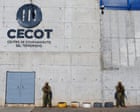
In a world where diverse issues continually intertwine, recent developments shed light on crucial topics involving human rights, spiritual leadership transitions, and electoral integrity. This article aims to calmly and clearly explore these varied yet significant areas, emphasizing the interconnected nature of our global society.
First, in a pressing matter regarding human rights and governmental accountability, Illinois Congresswoman Delia Ramirez has called for a congressional inquiry into the use of federal funds in detaining immigrants in El Salvador. Her concerns, shared with the US House’s homeland security committee, center around potential human rights abuses within a facility known as the Cecot site. This secretive location has detained nearly 300 immigrants following the start of Donald Trump’s second presidential term. Ramirez emphasizes the urgent need to scrutinize these operations to ensure the ethical treatment of those involved and transparent use of governmental resources.
In another sphere, attention turns to the serene hills of Tibet, where a spiritual transition is quietly unfolding. The Dalai Lama, who has been a spiritual beacon for over 80 years, is approaching the end of his tenure. Now 90, he openly discusses the process for selecting his successor. This transition is imbued with significance, given the historical context of China’s intervention in Tibet since the 1950s and the ensuing displacement of the Tibetan spiritual leadership to India. The forthcoming change signifies not just the end of an era, but a bridge to a new chapter in Tibetan Buddhism, one increasingly shaped by the complexities of modern geopolitics.
Meanwhile, in the United States, electoral integrity comes into sharp focus. The Department of Justice is actively requesting detailed information from several Californian counties – including Los Angeles, San Francisco, and San Diego – concerning non-citizens who appeared on voter rolls. This unusual request seeks transparency around the inclusion and eventual removal of these individuals, requiring local officials to provide comprehensive data such as voter registration records, voting history, and personal identification details. The earnestness of these inquiries underscores a broader commitment to ensuring that the voting process remains secure, equitable, and trustworthy.
These unfolding narratives, while distinct, are united by their reflection of universal concerns: human rights, spiritual continuity, and democratic integrity. Each presents its challenges and opportunities for insight. Together, they invite a broader contemplation of how interconnected actions and decisions on a global scale can shape our shared future. In emphasizing understanding and transparency, these issues pave the way for potentially transformative progress, fostering a world where ethical considerations remain at the forefront of societal advancement.
Through these endeavors across various domains, a larger picture of unity in diversity emerges, reminding us that addressing today’s challenges with calmness and clarity can inspire a more harmonious and informed world.
Source: {link}
